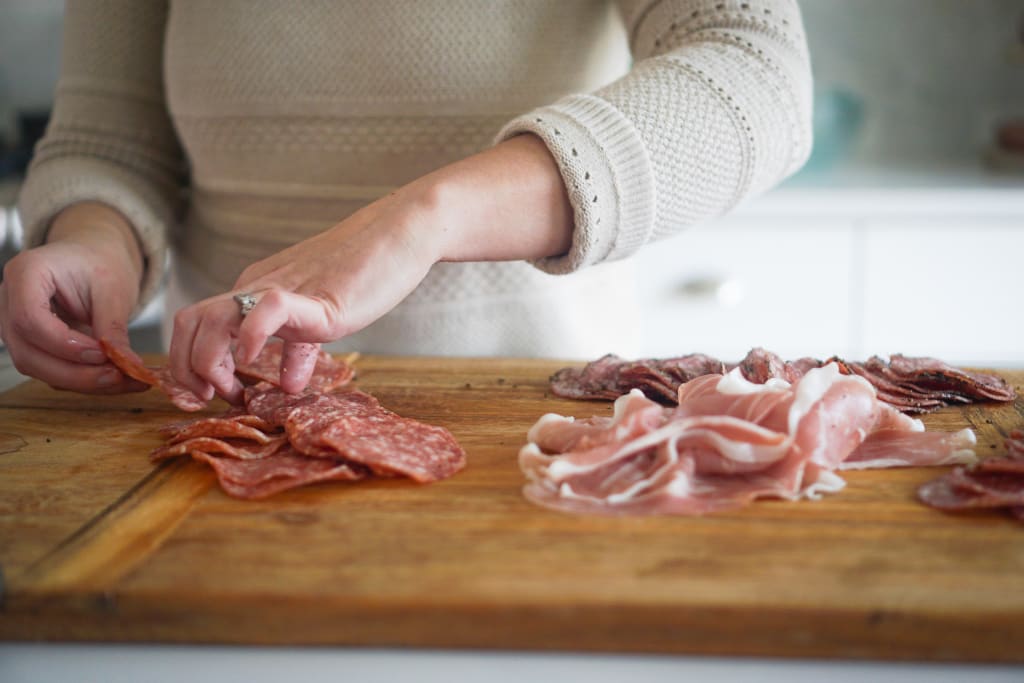I’m Not Jewish, But I Eat Kosher
Our diets shift perceptions of identity and religiosity

I vividly remember the last time I ate a pork chop.
I had flown to Chattanooga, Tennessee to visit some friends. I always looked forward to their stepmom's cooking. She was raised in a Pennsylvanian Amish family, which meant she inherited lots of amazing scratch recipes from her mom and grandmother. Since I flew from Florida to Tennessee to visit them a lot, I had the pleasure of enjoying many of these meals. The pork chop filled most of my plate, over an inch thick and glistening in fat.
My dad recommended a book to me around that time called The Genesis Diet by Dr. Gordon Tessler. Throughout its chapters, it unpacked how Jewish food laws still had applications to a modern Christian diet, an issue that had consumed my mind as of late.
I couldn’t get the questions out of my head. Why did we just decide to start eating pork and shellfish again? Why were these specific foods deemed unclean in the first place? What about other strange things we eat and drink, like milk, that aren’t addressed in the Bible?
Those questions really began one day when I went to the supermarket on the way to pick my brother up from school. I noticed this new bottle on the Target milk shelf called Ripple, a nutritious pea milk. Frankly, I thought it was ridiculous. First, there was soy milk, then the almond milks, even hazelnut and peanut milks. Now this? Pea milk? What’s wrong with the milk God provided us through animals? I thought people wanted to be picky to feel better about themselves or to be unique.
On that drive to my brother’s school, my scoffs turned into genuine interest. Why did I see other animal’s milk as my own? Actually, that’s pretty weird, right—consuming the product that converts a little calf into a 2000 pound beast? Wouldn’t that do some weird stuff to the human body? Is there a connection with this strange habit and lactose intolerance?
It’s worth noting that I am Dutch, which means dairy is a huge part of my family’s culinary life. Breakfast, lunch, and dinner usually all have a heaping of butter, cheese, and/or cream involved somewhere. We took pride in this tradition. I looked down on ‘vegans’ or didn’t truly believe people who said they had lactose intolerance (though, frankly, I definitely had these symptoms).
If my body wasn’t meant to consume dairy, there were larger implications… identity implications. It meant making a conscious effort to prevent myself from eating certain things. It meant telling people I was changing my habits. It meant proving I was committed to something I had been vocally patronizing for a long time.
I read The Genesis Diet. It changed everything.
Though the topic of milk is murky, and still confusing to this day theologically for myself, there are very explicit laws in the Torah sanctioning the abstaining of other eating practices. No pork. No shellfish. No exotic foods like frogs, bear, or other animals that eat other animals.
Themes emerged through the pages. No eating carnivores. No eating omnivores. Don’t torture the animals you eat—in fact, if you want to eat an animal at all, you must go through many time-consuming steps, which discourage one from over-indulging. Cut the fat, and burn it instead of eating it. In other words: eat cleaner, live longer.
The book described the Garden of Eden as a vegan paradise. There was no bloodshed and murdering of animals. There was no sucking the milk out of other species. Adam and Eve could eat from all (but one) of the trees and bushes available for them. These sustained them. This was, perhaps, the way we were designed to be.
The message didn’t go so far as to say it was sinful to eat animals, or that you’re breaking some sort of law to eat cheese or drink a milkshake, but it did beg important questions we must all confront for ourselves.
Is it a coincidence that eating these products causes negative environmental effects (green-house gases, etc.), long-term health issues (heart disease, stroke, etc.), short-term diseases (swine flu, plague, etc.), and life-long intolerances (lactose, etc.)?
In a way, that message broke me. It made so much sense, yet it felt there was no way to introduce these principles into my life. What would I do the next time my Oma offered to make me a kaas broodje (cheese sandwich)? What about the green tea ice cream in the freezer? What about bacon—what about so many American breakfast foods?
Part of me wanted to turn back and not think about it.
I sat there at the table, atop Signal Mountain in Chattanooga, cutting my pork chop into manageable bites. I hadn’t talked to many people about the doubts I was having about my eating habits. If I just ignored it enough, I thought I could make it through the meal without disappointing my friend’s stepmom. I could be ‘normal.’
I think I got 3/4th of the way through it, but it’s hard to remember the details besides how awful I felt. I thought I was going to throw up. I knew too much. It made it clear what had to happen for myself.
This event happened about two and a half years ago. Since then, I have committed to a dairy-free, kosher, and reductionist diet. This means I don’t each cheddar, clams, and I limit meat consumption to once every day or every other day.
It’s not quite where I want it yet (I would love to be vegan one day) but I can take pride in the effort I’ve made to do something instead of standing idle. I’ve had lots of conversations with people of all walks of life and religious convictions about these same issues.
It’s allowed me to bond with those different from me, those who perhaps, back then I couldn’t allow myself to content to in this intimate way… especially Jews, Muslims, and yes, even vegans. This in itself shows me how changing something as simple as our eating patterns is even religious in nature.
I feel better in my own skin (turns out I was lactose intolerant!), but I by no means feel that I’ve figured it all out.
The ways in which we eat greatly affect the ways in which we view ourselves, and the ways others view us. It’s not always easy to cope with.
Even after all these years, it happens all the time. Allison, do you want this cream cheese, bacon jam cracker? Allison, do you want a slice of this Gouda kaas? Allison, do you want a shrimp croquette?
I encourage you, if you have not already, to consider more deeply what you’re eating, and why you’re eating it. Is it culturally embedded? Does it sustain you? Does it provide you comfort? Is it social? It’s a journey, and it’s a daily decision to make, but boy, am I glad I allowed myself to explore this, and I hope you’ll consider it as well.
About the Creator
Allison van Tilborgh
Scholar of Communication and Religion. Editor of Interfaith Now on Medium. Amateur conversationalist.






Comments
There are no comments for this story
Be the first to respond and start the conversation.